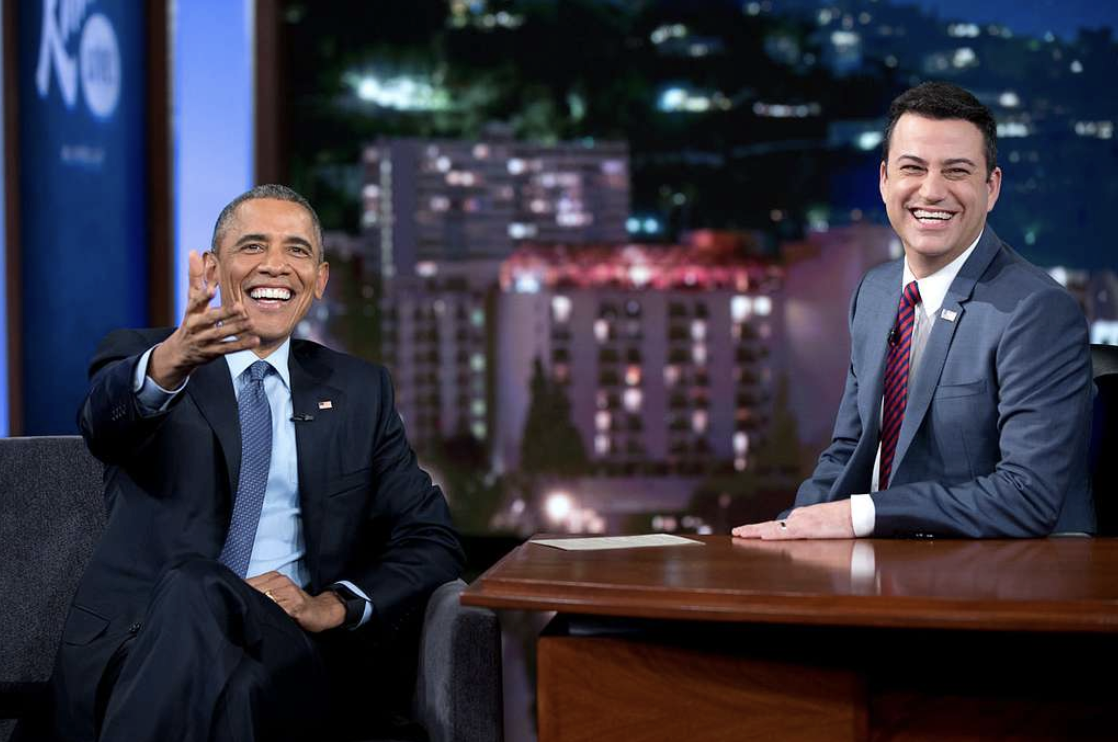
Just over a week ago, Jimmy Kimmel’s show was pulled off the air for his remarks about the assassination of conservative influencer Charlie Kirk. Despite public pressure and criticism from the right, however, Jimmy Kimmel Live! has returned to the airwaves on ABC.
This was the news I heard on the radio the morning of September 25th on my way to school. What caught my attention the most wasn’t Kimmel’s comeback, but rather what the radio host had to say about the situation. Here’s the gist of what he said: Jimmy Kimmel isn’t the type of person to make these comments because “he’s always been a genuine guy.” Anyone watching Kimmel on television today would probably agree, but he wasn’t always the wholesome father-of-four you see on screen now.
After hearing about the controversies involving Jimmy this past week, I did the only sensible thing: I took a deep dive into his history. Let’s go back to the very beginning of his career. Jimmy Kimmel’s career started in his hometown, Las Vegas, where he began hosting interviews on a local college radio station while still in high school. From there, he went on a series of unsuccessful radio jobs in Phoenix, Seattle, Tampa, Palm Springs, Tucson, and Los Angeles.
After twelve years of getting fired from various radio jobs throughout the 1990s, he made his grand debut on the television screen as the co-host of Win Ben Stein’s Money on Comedy Central. There, he acted as the audience’s comedic proxy, asking questions and setting the show’s iconic sarcastic tone. His performance was so well-received by the public that he even won an Emmy for Best Game Show Host in 1999.
Kimmel soon became an unstoppable fan-favorite, which gave him the platform to start his own production company just two years later with two of his best friends, Adam Carolla and Daniel Kellison. Together, they established Jackhole Industries, a name partly inspired by a swear word made up by Carolla to avoid objections from the Federal Communications Commission. The trio began developing not-so-family-friendly comedy shows and pitching them to networks like Comedy Central. One of their most well-known projects was The Man Show. Anyone who knows Kimmel well enough today may have trouble imagining him downing beer and cracking crude jokes, but that’s exactly what he did. Every week, for half an hour, the trio would chug beers while both celebrating and satirizing testosterone-fueled masculinity. They saved the “best” part for last, when models in bikinis would jump on trampolines to end each episode. The show was so successful that Kimmel was invited to serve as a commentator on Fox NFL Sunday.
Kimmel continued to produce comedy and game shows with his company. ABC saw his potential and helped him launch Jimmy Kimmel Live! in early 2003. His late-night talk show received mediocre reviews at first, but has since gained popularity. Starring celebrity guests from Barack Obama to Matt Damon, the show has outperformed numerous talk show rivals and even won three Emmy Awards. The light-hearted and relatable yet snarky style of the show differs greatly from the biting tone of The Man Show. Today’s Kimmel would likely criticize some of the comments and concepts of that raunch-infused show. It’s safe to say that Kimmel’s public persona has matured significantly since he first started his career.
That isn’t to say Kimmel hasn’t been completely free of controversy in the past couple of years. His witty personality has often gotten him into feuds, both big and small, with other celebrities. Conservatives, especially, aren’t a big fan of him. Ben Shapiro has been one of Kimmel’s major rivals, having publicly accused Kimmel of having a left-leaning agenda and poor ratings. Of course, you can’t forget Donald Trump. Surprisingly, his criticisms weren’t always political, as most of his insults were targeted towards what he deems to be Kimmel’s poor hosting abilities. He even called Kimmel “the worst host in the history of the Academy Awards” in a recent campaign rally. However, their political differences have spilled over into the media today, especially in the heated atmosphere after Charlie Kirk’s death.
It’s safe to say that Kimmel’s story is quite a spicy one. From bikini-lover to government enemy, he’s come a long way. He may have made certain mistakes along the way, but I think his genuine attitude helps him repair those slip-ups and keep moving forward. That’s why ABC had the confidence to re-establish his show on television. The next time you see him, just remember that behind the late-night laughs is someone who’s taken a long, eventful road to the stage he stands on today.
Sources:
Caruso, Catherine. “Jimmy Kimmel: The Triumphs & Controversies of the Late Night Host.” Biography, 24 September 2025, https://www.biography.com/movies-tv/jimmy-kimmel. Accessed 1 October 2025.
Cole, Rachel. “Jimmy Kimmel | TV Shows, Charlie Kirk, & Facts.” Britannica, https://www.britannica.com/biography/Jimmy-Kimmel. Accessed 1 October 2025.
Hartmann, Margaret. “Trump’s Beef With Jimmy Kimmel: A Brief History.” New York Magazine, 22 September 2025, https://nymag.com/intelligencer/article/trump-jimmy-kimmel-feud-history.html. Accessed 1 October 2025.
Saad, Nardine, and Regan Morris. “Jimmy Kimmel taken off air over Charlie Kirk comments.” BBC, 18 September 2025, https://www.bbc.com/news/articles/c203n52x1y9o. Accessed 1 October 2025.